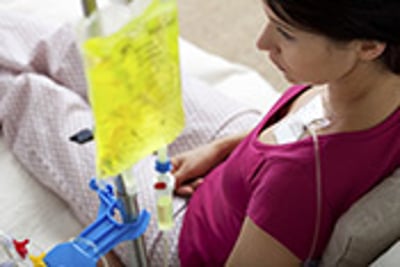Metastatic Breast Cancer



Relevance: Medium-High
Most relevant for: People diagnosed with breast cancer
Article: Coping with the financial burden of breast cancer
U.S. News & World Report recently talked to three breast cancer survivors, including two young women, about how they handled out-of-pocket costs and other medical expenses after their cancer diagnosis. (Posted 1/4/18)
READ MORE ›


Relevance: Medium-High
Most relevant for: People referred to a genetic counselor or those considering genetic testing
Study: Genetic counseling by phone or face-to-face
Results presented at the 2017 American Psychological Association’s annual meeting showed genetic counseling by telephone is as “safe and effective” in long-term psychological and social outcomes compared to traditional in-person counseling for women at risk for hereditary breast and ovarian cancer. This presentation is an update on research published in 2014. (11/29/17)
READ MORE ›


Relevance: Medium
Most relevant for: People who are considering or have had direct-to-consumer testing
Article: Mixed reviews of at-home genetic testing
National guidelines recommend that patients meet with a genetics expert before undergoing genetic testing for cancer risk. Genetic counseling can help patients decide whether genetic testing is right for them and order the most appropriate test. Once test results are available, genetics experts also help patients understand their results. Over the last decade, the popularity of direct-to-consumer (DTC) genetic testing, such as 23andMe has grown. Some genetic tests are marketed to consumers on television, in print advertisements, and on the Internet. These “at-home” genetic tests give people direct access to their genetic information without first involving a healthcare provider in the process. A recent report outlines the benefits and limitations of DTC genetic testing. (10/20/17)
READ MORE ›


Relevance: Medium-Low
Most relevant for: Newly diagnosed breast cancer patients
Study: Can chemotherapy before surgery fuel breast cancer metastasis?
Some breast cancer patients are given neoadjuvant (before surgery) chemotherapy. However, some recent studies have raised concerns that neoadjuvant treatment might actually trigger cancer spread in certain situations. In the current study, researchers used mouse models and human breast cancers to explore this possibility. (10/10/17)
READ MORE ›


Relevance: Medium-High
Most relevant for: Jewish women with breast cancer who previously tested negative for the three most common BRCA mutations
Study: Does expanded genetic testing benefit Jewish women diagnosed with breast cancer?
BRCA1 and BRCA2 mutations are common in people of Eastern European (Ashkenazi) Jewish descent. About 2% of all Ashkenazi Jewish people will test positive for one of three common mutations in these genes. Genetic testing for Jewish people sometimes focuses on only the three most common mutations. For Jewish women with breast cancer, little is known about their chance of carrying a different hereditary mutation that may increase risk. This study looked at expanded genetic testing in Jewish women diagnosed with breast cancer to learn how often they carried mutations other than the three most common BRCA gene mutations found in Ashkenazi Jewish people. (09/13/17)
READ MORE ›


Relevance: Medium-High
Most relevant for: Parents who have an inherited gene mutation
Article: Parents face challenges when deciding the best time to tell children that they may be at high risk for cancer
When certain types of cancers run in families, genetic testing can determine whether the cause is hereditary. Genetic testing can help family members understand their cancer risk and make medical decisions to stay healthy. A test result can provide significant insight, but it also creates challenges for parents, because gene mutations that cause hereditary cancers can be passed from mothers and fathers to sons and daughters. People with these mutations must make difficult decisions about when to tell their children that they too may have inherited the mutation. (8/22/2017)
READ MORE ›


Relevance: Medium
Most relevant for: Asian American women
Study: Breast cancer rates are rapidly increasing among Asian women in California
The majority of racial groups in the United States have seen declines in breast cancer rates. However, this study provides new insights into the patterns of breast cancer rates in Asian American subgroups in California. Using 26 years of data, this research found that breast cancer is rapidly increasing among this population, contrasting to a decline in rates among non-Hispanic white women in California and nationwide. (8/15/17)
READ MORE ›


Relevance: High
Most relevant for: People diagnosed with or concerned about their risk for cancer
Article: FDA busts myths of preventing and treating cancer by eating apricot kernels, herbs, and other ingredients
Maggie Fox (NBC News) writes about a new FDA report that warns of 14 "fraudulent” cancer products claiming to either cure or treat cancer (1). The companies that sell these products claim that many of them also prevent cancer, but are they safe or effective? (6/26/17)
READ MORE ›


Relevance: High
Most relevant for: Patient undergoing chemotherapy
Study: Does scalp cooling help prevent hair loss after chemotherapy?
Hair loss is one of the most recognized and distressing side effects of some chemotherapies. Two studies looked at the use of scalp cooling therapy to help reduce hair loss after chemotherapy for early-stage breast cancer. (5/15/17)
Update: Based on data from clinical trials, the FDA approved Dignicap scalp cooling device for treatment in patients diagnosed with solid tumors who are receiving chemotherapy.
READ MORE ›


Relevance: Medium-Low
Most relevant for: Patients with ER+ breast cancer
Study: Common genetic change found in some tumors of patients who relapse after aromatase inhibitor treatment
About one in five people diagnosed with estrogen receptor-positive (ER+) breast cancer relapse within 10 years after treatment. Researchers and health care providers do not know why this happens. This early research aims to identify a genetic change in the tumor that may cause relapse, but more studies are needed to understand why patients relapse and who is at risk. (5/3/17)
READ MORE ›